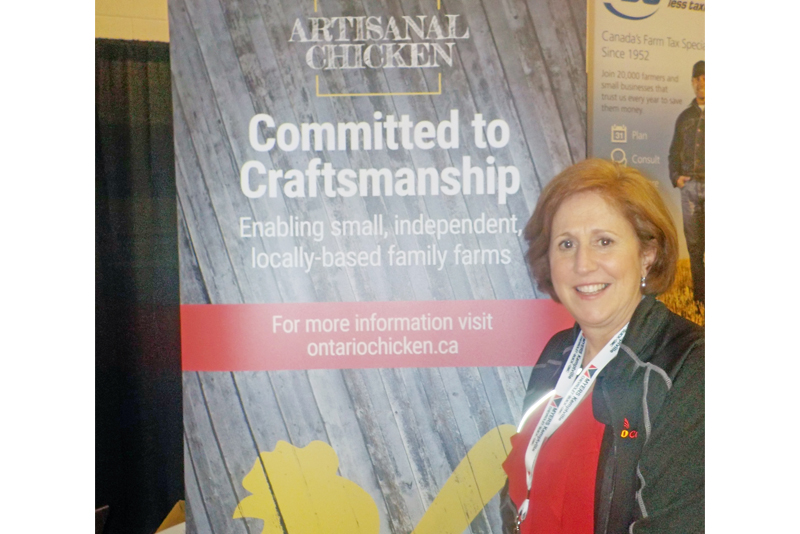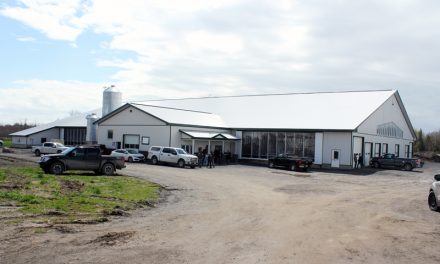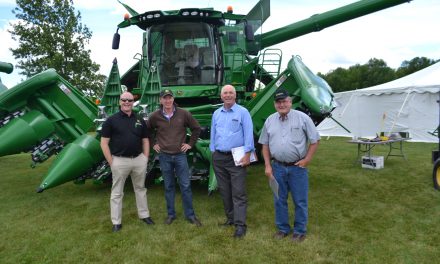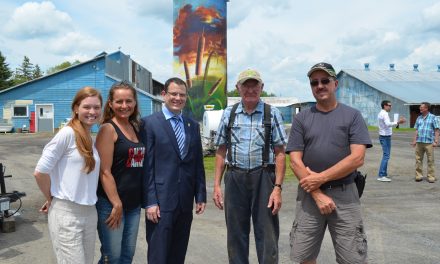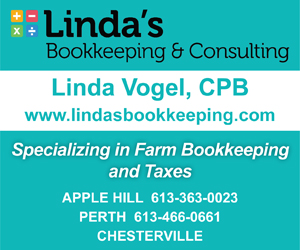Room for everybody
Patricia Shanahan, director of community business development, was in attendance at the CFO booth at the North Grenville Rural Summit on April 12 and 13. Van Dusen photo
KEMPTVILLE – Since its introduction four years ago, the Chicken Farmers of Ontario (CFO) quota-free artisanal program has been “embraced” with some 150 participants now enrolled across the province.
Program success was confirmed by Patricia Shanahan, CFO director of community business development, who had an information booth at the North Grenville Rural Summit April 12-13. The program allows small producers to raise up to 3,000 meat chickens every year; there’s no application fee but producers pay CFO 25 cents per bird, Shanahan explained.
She sat in on a presentation at the summit by artisanal program fan Bart Millson of Kemptville Chicks which this season will process 2,000 birds; the summit was designed to underscore potential opportunities in agricultural production and processing in North Grenville and surrounding area.
Shanahan was on a tour of Eastern Ontario visiting some artisanal farmers, checking accommodations, conditions and practices. Noting that Kemptville Chicks is meeting all requirements, Shanahan said it’s important to CFO that its commitment to animal care, health and welfare be adhered to at the artisanal level.
“There’s room for everybody,” Shanahan said when asked if there’s any concern among quota producers that artisanal growers – who must target non-traditional markets – are getting too big a piece of the pie. “The chicken business is so good these days there are no complaints.”
Millson emphasized that his six-pound dressed chickens are genuinely free range, eating grass, bugs or all-grain, and not kept in rotating pasture cages. He believes in raising healthy “dumb lovable” chickens, either conventional ($4.75 per pound) or non-certified organic ($6.25-pound), for his customers and family.
Don’t expect much in the way of profits for five years, Millson cautioned, citing time needed to fully invest in infrastructure and determine long-term viability; flexibility is essential. The payoff is the “inherent satisfaction” of running your own business.
Although small in comparison to big farming, niche production such as Kemptville Chicks contributes to the local economy, Millson said, estimating he’ll drop $30,000 with nearby equipment and feed suppliers this year.
Millson and his partner purchased 42 acres near Kemptville in 2003 which they cash-cropped. Several years later, they hatched Kemptville Chicks under the CFO program, the idea being to supply local customers under the farm-to-table mantra.
However, Millson said, the mantra is starting to be met with skepticism on the part of many consumers who see it as a marketing ploy that’s overused and often unsubstantiated; what’s required now is for small producers to develop personal relationships and credibility with their customers. He learned the hard way, growing a first batch of 200 artisanal chickens, only 18 of which sold.
Since then, the output has grown to an anticipated 2,000 birds sold to a repeat clientele which has been developed through local publicity, a detailed website, testimonials, and public presentations: “The key is personal connection and trust.”
They’ll pay premium prices but customers demand 100 per cent transparency in growing, handling and processing practices. Birds are raised over three to four, 11-week growth cycles.
Combined with a small trade show, other concurrent Rural Summit presentations covered vertical farming, regulatory changes, organic farming, succession planning, agri-food startups, respecting food sources, challenges of running a winery, small-batch brewing, heritage livestock, robotics, the cannabis sector, and business planning.

